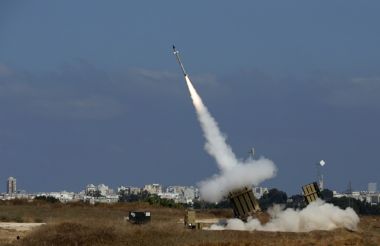Israel warns growing arms race in Mideast could threaten its qualitative military edge

The commander of the Israel Air Force (IAF) has cautioned that the growing international military deals by its neighbours could create "a potentially dangerous situation'' to Israel's military superiority in the region.
Air Force chief Brig. Gen. Tal Kalman told participants at the Fisher Institute for Air and Space Strategic Studies' conference in Tel Aviv that Israel is concerned that these weapons flowing into the region "could shift the balance of power'' and threaten the country's qualitative military edge.
"There is the potential here for the erosion of the IDF's qualitative edge and the IAF's qualitative edge,'' Kalman said, according to CBN News.
The general made the remarks which apparently were aimed to help secure more defence aid from the United States in order for Israel to boost its armed forces, not just upgrade their technologies, to keep ahead of potential foes.
"There are countries here which have plans that are being actualised for arms deals in the hundreds of billions of dollars, for the most advanced Western weaponry and the most advanced Eastern weaponry,'' he said.
Kalman cited Iran, which the Israelis fear will utilise sanctions relief from last year's nuclear agreement to build up its ballistic missile programme and arm Islamist guerrillas like the Hezbollah militia of Lebanon.
The U.S.-led Iranian nuclear deal and the $150-billion cash influx to the Islamic Republic have made huge sums available to unstable governments in the region. Iran, considered as the world's largest state sponsor of terrorism, has played a key role in many deadly terror attacks worldwide, CBN News reports.
There have also been reports of Egyptian officials expressing interest in acquiring advanced Russian arms. Syrian President Bashar al-Assad is also reported to have access to Russia's S-300 and S-400 air defence systems deployed in the war-torn country.
As of last year, the State Department said some $33-billion worth of weapons were sold by the U.S. government to its Gulf allies.
"There is a very great danger here, because today's enemy can be tomorrow's friend, and today's friend could be tomorrow's enemy," Kelman said in the forum hosted by Israel Defence magazine.
The general's comments came amid ongoing negotiations with the United states over military aid package, with Israel reportedly requesting additional assistance from America beginning in 2018.
Israel currently receives approximately $3 billion a year from the U.S. but when the current aid package ends in 2017, the country has requested that amount be increased to closer to $5 billion a year in order to maintain a qualitative edge over its enemies.











